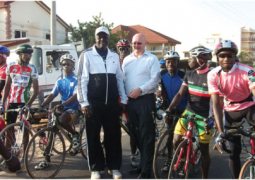World Breastfeeding Week (1-7 August 2013) is celebrated every year from 1 to 7 August in more than 170 countries to encourage breastfeeding and improve the health of babies around the world. It commemorates the Innocent Declaration made by (WHO) and UNICEF policy-makers in August 1990 to protect, promote and support breastfeeding.
Breastfeeding is the best way to provide newborns with the nutrients they need. WHO recommends exclusive breastfeeding until a baby is six months old and continued breastfeeding with the addition of nutritious complementary foods for up to two years or beyond.
This week, Dr Hassan Azadeh, our health adviser, a senior lecturer at the University of The Gambia, and a senior consultant in Obstetrics and Gynaecology explains the massive benefit of mother’s milk and the huge immunological support for her baby from the first minute after delivery for at least up to over 6 months.
Dr Azadeh also commended the Gambia Government through the Health Ministry for extending the conferment leave for every mother in the Gambia up to 6 months contributing not only to their new born babies but also for the mother’s health too.
Exclusive breastfeeding for the first six months is the single most preventive intervention for ensuring child survival. A Lancet-published study estimates 13 percent of all deaths of children under five years old could be prevented by exclusive breastfeeding, while a further six percent of deaths could be prevented by combining exclusive breastfeeding with the timely introduction of appropriate
Breastfeeding promotion
Breastfeeding promotion refers to coordinated activities and policies to promote health among women, newborns and infants through breastfeeding.
The World Health Organization (WHO) recommends infants should be exclusively breastfed for the first six months of life to achieve optimal health and development, followed by complementary foods while continuing breastfeeding for up to two years or beyond.
However, currently fewer than 40% of infants fewer than six months of age are exclusively breastfed worldwide. Public health awareness events such as World Breastfeeding Week, as well as appropriate training of health professionals and effective planning, aim to increase this number by communicating the importance of protecting, promoting and supporting breastfeeding so that infants receive appropriate nutrition and complementary foods after age six month
Mothers’ milk is nature’s most precious gift to mankind. From the inception of , mothers’ milk has been the chief source of nourishment for babies. It is not only the first source of nourishment for the newborn it is also the primary instrument of bonding for the mother and child. The baby suckling at the mother’s breast not only derives nourishment but is also enveloped by tremendous mother love, warmth and security.
This leads to the development of the mind, self-confidence and all other attributes needed for the child to grow into a good and strong adult.
Stick to breastfeeding in The Gambia
It is common knowledge that breast milk is good for the growth and development of the child. It is easily digested and efficiently used by the body.
The importance and benefits of breast milk to the child cannot be over-emphasized, as it creates a strong bond between mother and child through the act of breastfeeding.
Breast milk provides babies with their first immunisation dose from infections and bacteria. Babies are also less likely to become ill with preventable conditions, such as pneumonia, which accounts for 17% of child deaths globally and diarrhea, which also accounts for 16%.
Breastfeeding improves the physical and mental development of the child. Several studies conducted on children of various age groups have shown a great increase in intelligence in children who are breastfed, in comparison to those who were not breastfed.
In 1998, it was estimated that breastfed children between 6 months to 2 years of age were 2 points higher in intelligence than those who were fed with formulas.
Similarly, in 1992, the intelligence of breastfed children aged 7-8 was 8.3 points higher and in 1996 breastfed children, aged 9, was 12.9 points.
Mothers and breastfeeding women should make sure that their babies are well-fed with their breast milk to protect them from diseases, especially at a very early age.
In The Gambia, the National Nutrition Agency (NaNA) has made significant strides in the area of exclusive breastfeeding.
This should not only stop there, but more efforts should be taken to promote and encourage exclusive breastfeeding. The feeding of babies with formulas should be discouraged as its negative impacts outnumbered its positive effects on the health of child.
It is our belief that it is only by doing so that our children can become more protected from disease, and even boosts their intelligence.
All religions too recognize the value of breast milk. Unfortunately, this most precious gift of nature came to be pushed into secondary place especially with the evolvement of modernity. Formula Feeds became the trend encouraged by vendors of substitute milk foods especially in the developing world.
Aggressive marketing strategies succeeded in brainwashing generations of young mothers and made them oblivious to the dangers of artificial milk foods.
Thankfully for mankind, there were still rational voices crying in the wilderness and at a point of time these voices were heard and most importantly heeded. Thus, back to the breastfeeding movements gained momentum universally and in the 1970’s took centre stage when the exposure of the devastating effects of bottle feeding took place and many organizations were established to foster breastfeeding and attendant attributes especially over the last several decades like the World Alliance for Breastfeeding Action (WABA).
The World Alliance for Breastfeeding Action (WABA) is a global network of individuals and organizations concerned with the protection, promotion and support of breastfeeding worldwide. WABA action is based on the Innocent Declaration, the Ten Links for Nurturing the Future and the Global Strategy for Infant and Young Child Feeding. Another organization taking the lead in fostering breastfeeding is International Baby Food Action Network (IBFAN).
The thrust of WABA’s work is to provide common platforms to facilitate universal collective action and the main avenue is World Breastfeeding Week 2013.These organizations not only encouraged a return to mother’s milk but also fostered other necessary factors as peer counselling, the 2013 World Breast Feeding Week’s theme. La Leche League International spearheads this vital aspect of support for breastfeeding mothers globally. Mother to mother support breastfeeding movement.”
Peer counselling is a cost-effective and extremely productive way of reaching a greater number of mothers more frequently. Peer Counsellors can be any person in the community trained to support mothers. Peer counselling becomes essential when nursing mothers do not visit post natal clinics. Then such community support becomes a lifeline.
Traditional support for nursing mothers came from the immediate and extended family but with society’s change and the onset of urbanization support for mothers from an extended circle has become essential. There are five recognized circles of support for nursing mothers, namely Family and Social Network, Healthcare, Workplace and Employment, Government Legislation and Response to Crisis or Emergency
Poor bottle feeding practices
Several key recommendations have been made to fill these gaps. These include the formulation of a detailed plan of action laying out how the IYCF promotion and support will support the achievement of broader development objectives related to reduction of under nutrition and neonatal mortality, establishment of the independent assessment need, educating public and private sector of their responsibilities and the benefits of mother-friendly workplaces.
There is an urgent need of coordination between the Ministry of Health, NGOs and community members on the role and contribution of the community and nature of their participation, funding to be prioritized, ensuring utilization of data by key decision makers and more improvements to reduce rate of bottle feeding.
The Saroyan Women’s Movement is striving to implement these recommendations and included in this process is the mobilization of circles of support groups at community level. They are also aiming to achieve the objectives of WBW 2013 and ensure healthy and strong generations of Sri Lankans in the future.
Further information can be found at all Government’s Hospitals and Clinics, Health Ministry, Neonatal Unit, Number of NGO’s and private Clinics. Send e mail azadehhassan@yahoo.co.uk, or send text to Dr Azadeh on 7774469/3774469.
Read Other Articles In Article (Archive)



